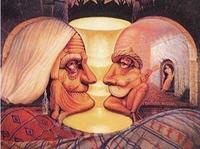| Wednesday, June 27, 2007 |
| Naïve realism |
 Wikipedia: Wikipedia: Naïve realism is a common sense theory of perception. Most people, until they start reflecting philosophically, are naïve realists. This theory is also known as "direct realism" or "common sense realism".Thanks, Anandavala for mentioning it in your article The Scientific Case Against Materialism. The Wikipedia entry tries to imply that it is something that kind of doesn't apply to scientists, which of course isn't quite so. Actually the odd statement there that "the universe really contains just those properties which feature in a scientific description of it" hints at where scientific thinking can get off track, but maybe there's another name for that. You know, the idea that reality is what is found in sufficiently agreed-upon scientific theories, rather than what it really is, beyond any kind of theory. You'll also find an oddly large percentage of those people who claim science as the foundation of their thinking who mostly argue for what science used to be. You know, aristotelean and newtonian kind of science. Which involves a certain kind of naïve realism, at least in comparison with more modern stuff. I mean, that the universe consists of seperate objects that have properties like mass and that are subject to gravity. Oh, that's how it appears on a superficial and tangible level, and that's practical for building houses, and satellites, and for maintaining your household in a sane way. But in terms of how it really is, it seems to me that science has been beyond that for a century or so. But a lot of us haven't really internalized stuff like quantum physics and even relativity theory, because it is odd and counter-intuitive. Because it doesn't fit with our naïve kind of observation of what is there. So we easily default to arguing that all the odd stuff is impossible, part of some kind of organized scam, or at best an unproven theory. OK, I often complain about this kind of thing. It is one of my pet issues. And "Science and Sanity" is still on my list of all time most important books written. It is important not to forget that your simplified idea about reality is not reality, no matter who agrees with you. The foundation of sanity is to stay aware of the difference between perceptions of stuff and the real stuff. Here's another article that Anandavala links to: The first stop on our tour is a place called "naive realism." Naive realism is a way of looking at the world. Ways of looking at the world are sometimes dressed up with the word "philosophy," but I won't split a hair's difference.I hope so, but that's where I'm skeptical. Real science, yeah. But there's the widespread belief system, sometimes called materialism, which tends to trump science if one doesn't watch it. I.e. that the world is fundamentally the world of physical objects we see, and nothing that isn't material could possibly exist, and anything else that appears to exist can only come from matter, and no other explanation is possible and even worth considering. You know, naïve materialism. Accepting things without considering the alternatives and without verification. [ Science | 2007-06-27 00:58 | 9 comments | PermaLink ] More > |